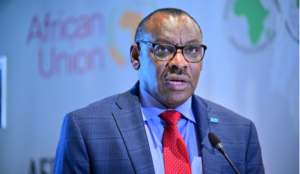De-risk investments in Africa to unlock full potential of public private partnerships – Gatete

Claver Gatete, Executive Secretary of the Economic Commission for Africa (ECA) has called for a shift in perspective and a more “intentional and targeted use of foreign direct investments and official development assistance, if Africa’s partnership with Europe is to deliver on the promises of shared prosperity.”
Speaking at the 5th European Corporate Council on Africa and the Middle East (ECAM Council) Summit on the margins of the Italy – Africa Conference in Rome, Italy, Mr. Gatete said this shift should include de-risking investments in key sectors that can unlock the full potential of public private partnerships. The Summit was held on the theme: “Creating a better present to build a greater future for Africa: the role of healthcare and investments.”
“Up to 80 per cent of the initiated infrastructure projects across Africa fail at the feasibility and planning stages. African countries are also faced with unfair risk perceptions that deter investors. We need to reverse this trend,” he noted, adding that to address the current severe fiscal pressures that countries are confronted with, new and innovative financing sources that target investments better to get the most of each dollar or Euro invested are necessary.
“This means that the public sector must step in to finance de-risking measures that will attract the private sector. We should be more intentional about leveraging FDI and ODA to de-risk private investments,” he said.
A 2023 Report by UNCTAD shows that between 2011 and 2022, combined public-private partnerships resulted in lowering interest rates spread by up to 40 per cent in renewable energy projects in developing countries. However, Africa still only attracts 2 per cent of global renewable energy investments today because the business environment remains unfavorable.
“De-risking investments in Africa will make the region a globally competitive investment destination with mutual benefits to Europe, Africa, and the rest of the world,” said Mr Gatete.
According to Mr Gatete, although the Europe’s relationship with Africa has been driven by the priorities of official development assistance, foreign direct investment (FDI) and official development assistance (ODA), FDI constitutes only around 5 per cent each of Africa’s financial resources.
“FDI inflows into Africa have been static, hovering around the US$40 to US$50 billion annually, a trend that began well before the Covid-19 pandemic,” he said.
Preliminary data from the OECD Development Assistance Committee, in 2022 shows that only five countries met or surpassed the UN’s target of allocating 0.7 per cent of gross national income to development aid.
Mr Gatete noted that numerous initiatives have been launched to leverage FDI and ODA, yet Africa has not fully realized the desired impact. Furthermore, initiatives like the G20’s Compact with Africa, which was designed to increase private sector-led development and develop domestic markets, is yet to attain its full potential.
ECA is conducting growth diagnostic studies, market and product space analysis, GIS-enabled hotspot analysis to clarify where to invest. These actions will increase the pipeline of bankable projects and ensure that countries make informed investments decisions whilst also generating multiple dividends, in line with the sustainable development goals.
Source: ECA
